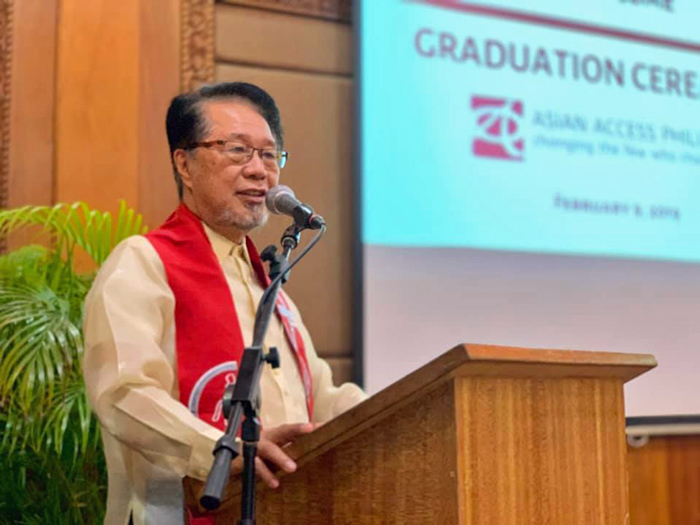by H.A. Moldez, National Director of A2/Philippines
A more biblical understanding of discipleship is critical to disciple a nation.
Planting a church as a signpost of the Kingdom of God to evangelize a community is a good start. However, in a success-driven ministry, many pastors and leaders are simply dreaming of making their churches grow big and bigger. When the world’s criteria for success drives the ministry, discipleship is hurried up without the spiritual depth necessary to impact society.
 The World Evangelical Alliance’s call to a “Decade of Discipleship” needs radical calibration to grow deep disciples rooted in Christ (Colossians 2:6-7). Discipleship strategy and philosophy must be unshackled from the mass production system of current discipleship models in order to develop fruitfulness in Christlike life and leadership. This requires slowing down, focusing on young believers as well as leaders and mentoring the heart in a life-on-life conversation to process life’s stories in the light of God’s voice and direction (Scriptures and the Holy Spirit).
The World Evangelical Alliance’s call to a “Decade of Discipleship” needs radical calibration to grow deep disciples rooted in Christ (Colossians 2:6-7). Discipleship strategy and philosophy must be unshackled from the mass production system of current discipleship models in order to develop fruitfulness in Christlike life and leadership. This requires slowing down, focusing on young believers as well as leaders and mentoring the heart in a life-on-life conversation to process life’s stories in the light of God’s voice and direction (Scriptures and the Holy Spirit).
Pastors and leaders must develop a new mindset of discipleship.
The perspective that discipleship is only for new believers or younger leaders must be rethought within overall Biblical teaching. Discipleship is a life-long journey of following Jesus Christ as the Lord of all of life. It is intended to be “a long obedience” to become like Christ. No one graduates in the school of Christ.
 If we are to advance and deepen the envisioned Decade of Discipleship, we need to all pastors and leaders, irrespective of age and position, to undergo a vulnerable process of in-depth heart-to-heart discipleship.
If we are to advance and deepen the envisioned Decade of Discipleship, we need to all pastors and leaders, irrespective of age and position, to undergo a vulnerable process of in-depth heart-to-heart discipleship.
Pastors and leaders have too much in their heads. Truths clog their brains, bypassing the humble and honest heart-processing of truths that transform (2 Timothy 3:16-17; Habakkuk 4:12; James 3:1-2). Transforming processes happen effectively if leaders open their hearts, speak the truth to one another in love and share beyond their ministry achievements in a climate of grace.
The deep issues of discipleship among pastors and Christian leaders are related to pride, integrity, insecurity, forgiveness, competition/drivenness, comparison and priority of marriage and family over ministry, not to mention lust/porn and workaholism. Most pastors and leaders have learned enough theology and biblical knowledge. What they need is a safe place to be themselves in order to confess imperfection and failure without fear of rejection. They must find real friends who come alongside them. Many seminary professors avoid the nitty-gritty of practical and contextual applications, speaking from their own experience and needs. They excuse the heart of discipleship—intentional growth in Christ—by saying the students must work on that and then never returning to the subject. Without intentional and practical embracing of truths, application becomes an aspirational intention rather than an actual integration of Christlikeness with life and ministry.

Disciple-making—life-integration—is messy.
It creates insecurity. An environment of grace where vulnerable courage is demonstrated is a prerequisite for pastors and leaders submitting to humble accountability and honest permission for others to speak into their lives. Pastors and leaders don’t need good advice so much as godly awkward questions that initiate a painful process of transformation. Learning to submit to deep and down-to-earth mentoring or disciple-making is difficult for high-level leaders who are accustomed to requiring submission to their demands and decision. Letting go of leadership control and command in order to learn in humility the way of Christ is the essence of being a disciple. Unless pastors and leaders engage in heart-to-heart mentoring, their “discipleship” stays in the cognitive realm of teaching and knowledge (John 5:39-40; 1 Corinthians 8.1).
Many older pastors and leaders acknowledge their inhibition and inadequacy to practice life-on-life mentoring-discipleship.
This is primarily because they have never experienced being discipled by someone who engages their hearts and the messiness of life and ministry in a safe environment of grace.
A deeper discipleship movement must start among leaders.
This is very challenging because it calls for downward mobility. Many leaders’ aspiration is to move up the career path, no matter what. Truly serious discipleship, being and becoming radical followers of Christ, can only happen if we empty ourselves of ambition to greatness and accept the way of grace. To follow the selfless way of Christ, every pastor and leader must become part of a small group of spiritual friends committed to frankly and freely giving feedback, asking questions, crying and laughing about everyday life, and simply journeying together in following Jesus Christ.
 Herman Moldez
Herman Moldez
National Director, A2/Philippines
More Information
- Other articles from Herman:
- Country Profile: Philippines
- Other articles about the Philippines










Recent Comments